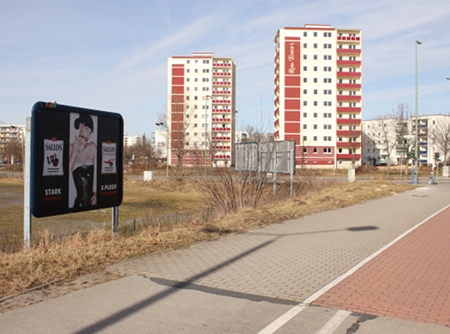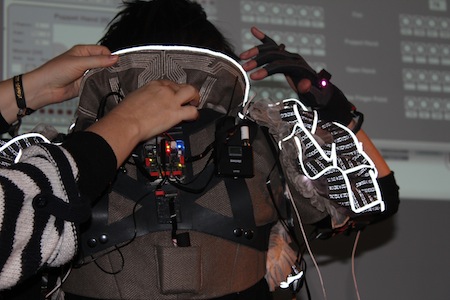Maxwell’s equations of human behaviour
Monday, May 27th, 2013
on the attractivity of locations: refurbished buildings in Marzahn-Hellersdorf, among them the now newly renovated Rhin Towers
I have found Maxwell’s equations of human behaviour!
randformblog on math, physics, art, and design |

on the attractivity of locations: refurbished buildings in Marzahn-Hellersdorf, among them the now newly renovated Rhin Towers
I have found Maxwell’s equations of human behaviour!
Tim’s midi-osc article has now an explanation on How to sew the vmeter sleeve and a video which shows the wireless vmeter in action:
Tim has written and put together some code for a wireless USB midi/OSC connection.
A sort of brief follow-up to the last two posts about simulations. Here a link to Tim’s simulation of a critter under the couch.

artwork: “Berlin citysimbim” by glocki
This post is a kind of follow-up post to the last one, which dealt amongst others with simulations of political/economic scenarios in multiplayer online games. In a couple of days a new SimCity game will come out and as Wikipedia puts it:
This version of SimCity will be the first to feature full online play since Maxis’s SimCity 2000 Network Edition,[1] allowing for regions to house multiple cities from different players. Regions can alternatively be set to private for solo play.[31] SimCity will require players to be logged into EA’s Origin service to play the game, including when playing single player.
or as SimCity.com puts it:
SimCity has truly connected cities within larger regions for the first time. Cities do not exist in a bubble – they are living, breathing systems that make up a region – and now you can trade and share resources among cities and regions in real time.
Unfortunately the above mentioned Origin seems to have sofar stirred up a lot of controversy about privacy issues. In Europe there are currently new data protection regulations underway, which by the way seem to be heavily “informed” by lobbyists. (The website Lobbyplag (unfortunately sofar only in german) gives an overview, which law drafts have been directly pasted in from which lobbyists brochures.) In view of this ungoing process it is thus however sofar not clear wether any of the discussed privacy issues of Origin will have any or what juridicial consequences.
SimCity2013 seems to allow for no modding at least right after launch. That is in an interview with gameinformer SimCity lead producer Kip Katsarelis replied to the question:
Is there an element of user-created content and sharing in city customization?
We’re not committing to any of that at this time, but we know that is part of Maxis. In SimCity 4, a lot of those tools were released pretty much a year after launch. So, definitely on our minds, but I can’t promise that we’re delivering on any of that right now.
If modding would have been possible then -apart from eventual privacy/data protection problems- the people from the project of the last post could have eventually thought about wether it would make sense to use SimCity2013Mods for their purpose. However it should also pointed out, that even if modding would be possible then too political game mods could pose problems.
One should also think about the economic consequences of computer simulations/games etc. (you may eventually also want to read my comment on the blog Backreaction in this context.)
addition 13.12.17: For the readers convenience, here a copy of the comment on the blog Backreaction:
nad0815 said…
What you seem to be somewhat discussing is to some extend wether there exist some god(s).
That is if I replace “simulation” with “creation by god” and if I replace “computer” with “human mind accessible universe” then your discussion looks very similar to that discussion.
Finally wether something feels “simulated” or “real” is quite a question of perception. You may eventually want to read:
And since there are quite some humans who claim that they already saw/perceived/DISCOVERED the “simulator(s)” your “coincidence problem” seems to be spread over all centuries.
you wrote:
“To begin with, unless you want to populate the simulation by hand, you need a process in which self-awareness is created out of simpler bits. And to prevent self-aware beings from noting the simulation’s limits, you then need a monitoring program that identifies when the self-aware parts attempt to make an observation and exactly which observation.”
Why should self-awareness (of limitations) be necessary to simulate self-aware entities? In fact a simulation of (aware) entities could happen by un-self-awarely mimicking a construction process and/or by chance. In that case your simulation would neither be a “creation of an aware god” nor be it “fully self-organized by some abstract laws and/or random outer conditions”. And thus there seems to be in particular no reason why simulated entities need to be kept from noticing that they are simulated like in order “to save on computational power” – that is they could awarely simulate without knowing that they are simulated themselves or they could even simulate whatever while being completely unaware of whatever. Both would need calculational power.
In fact I do think that nowadays “simulations” in computer games (and related computer environments) use up a lot of power, labour, time etc. and that this seems to have already quite an economic impact:
http://www.azimuthproject.org/azimuth/show/Economic+growth+and+limitationsSo you’d never observe any effects of finite lattice spacing because whenever you look all symmetries are restored. Wicked. It also creates other scientific problems.
(short side remark: There exist of course also fractals)
Considering the alien question: The reason that we have sofar not detected any “aliens” could of course be also for the reason that mankind has sofar been regarded as a kind of “baby civilization” and has thus sofar been protected from any shocks which could result from meeting the aliens…
5:24 AM, March 03, 2013

Musician Imogen Heap in her tech wear
In a recent comment on randform randform reader Bibi asked:
You had written at Azimuth that your idea to use MMOGs for simulating economic and political real world scenarios
seems to have recently been picked up for the Global Participatory Platform of the 2013 Flagship proposal FucturICT
It seems also that your scientific platform idea had been picked up for that ICTfutur grant proposal.
What about your intellectual property?
The FuturICT application for 1 billion Euros had though been turned down, will you now write an EU grant proposal?
Answers to this comment after the click.
The informed randform reader knows that I am a proponent of open access to (up to now) mostly publicly funded academic papers with the side remark that the full access to results with possibly hazardous implications may eventually need to be treated differently. In the randform post “petition for open acess to EU research results” MIT’s open courseware was mentioned as a good example for open access. In this article it was also mentioned that
At this point one should maybe remind the EU about the benefits of open source software and communities for their research institutions. These open initiatives are supported by individuals who contribute to the community usually in their free time.
In an older randform post: focus and context, part IVa: Codes and context, based on an observation by Aaron Swartz, it was mentioned that this engagement depends on the overall living conditions of that individuals.
Given MITs engagement in open access I was now shocked to hear that MIT was apparently involved in charges against Aaron Swartz, which were made because of his release of JSTOR documents. I didn’t know that the charges could have brought him 35 years in prison – I had viewed the JSTOR-release rather as an act of a kind of civil disobedience. I also didn’t know about his apparently rather strong depressions, in fact I never met him, not even communicated with him. I am shocked and very sad to hear about Aaron Swartz suicide. My consolations to his family.
I find it quite evident that such exorbitant charges contributed to his overall psychic condition and the role of the involved institutions and people sheds no good light on them.
Nevertheless in general I think it may be important to speak out about depressions and other comorbidities of academic life (and maybe also other lifes under pressure).
But speaking out alone may – so sad and heart-wrenching – not be enough.
Thus as a consequence of Aaron Swartz death Ian Gent and Mikael Vejdemo-Johansson (via Sarah Kendrew) opened a blog called depressedacademics:
So that’s why I’m starting this blog. Academics should have a place to see other people’s stories. To see that it’s ok to be depressed. To see that it’s normal. To comment and discuss if they want. And to share resources on depression, whether related to academia or not.
…where I am not sure wether it is really good and normal to be depressed. It should also be pointed out that speaking openly out in public about disorders and sicknesses should probably made only by individuals in secure social conditions. Being open about that topic may have severe consequences on your health insurance, occupational disability insurance, work and carrier opportunities etc.
As a side note: There may be a blog freeze on randform. That is my MAC seemed to have died now for sure and I am currently writing on a borrowed one. The laptop made suddenly only more 3 beeps while trying to boot, a signal which means “no good banks”.
Der deutsche Text in diesem Post ist nach dem Link:
Read the rest of this entry »
As described in the last german TAX post I was trying to get information about german income taxes, in particular I wanted to get the concrete formulas. I asked via fragdenstaat.org at the Federal Agency for Civic Education (Bundeszentrale für politische Bildung: BPB) for that information, since they have a webpage about income taxes. This page however cited only a little phrase, with the names of the different income zones before I wrote the letter, but luckily it got meanwhile at least a little revamped. However the page still doesn’t show the formulas, moreover it is not very up-to-date. In addition the BPB was not only not able to help me with my request, but I was told that:
” In Bezug auf weitere steuerrechtliche Auskünfte bitte ich Sie, von Anfragen bei der bpb Abstand zu nehmen, weil wir definitiv nicht dafür zuständig sind.”
(translation without guarantee: with regard to further tax law requests I ask you to precind from sending further requests to BPB, because we are definitly not in charge for this.)
I should maybe also mention that I asked a representative of the ministry of economics for the formulas, who said I should ask a tax consultant.
As already said in the comment at fragdenstaat.de I had then finally found formulas for the taxes 2010-2012 (after a long search). The formulas are on the site of the ministry for finance with the taxcalculator and you can get the formulas if you type in any income, and then hit the button “BERECHNEN”. I couldnt however find the formulas for the original draft for the taxes for 2013 from February last year, neither the formulas for the new draft as of december 12 last year for the taxes for 2013. Mr. Liebig, who runs the website www.lohn-info.de had however found them and had included the numbers on his site, so I wrote him an email and asked him for the links.
I have meanwhile got an answer from Mr. Liebig who had kindly send me the links via email.
A document which describes the taxes for the upcoming year, as of 121212 is at the website of the Bundesrat.
A document which was the old draft for the 2013 taxes and which was intended to mitigate the impact of higher taxes due to BRACKET CREEP is at
http://dip21.bundestag.de/dip21/btd/17/086/1708683.pdf
I meanwhile included the new numbers into the formulas. Details (in german) and the mathics code can be found after the click.
The result in short: If I didn’t miscalculate then there are tax reductions of 8-24 Euros/year for the incomes above 13500 Euros per year. For incomes of 8100 Euro to 13500 Euros there is a tax increase of about 15 Euros/per year. The procentual bracket creep (not sure wether this is called this way, please look at formulas) is for 6% income increase maximaly about 2.5%, for 2% income increase it is about 0.8%.
I am currently spending too much time with trying to get informations about
german tax laws. If you speak german you can read the discussions at
fragdenstaat.de, which sofar ended up with me writing an Income-tax calculator for 2012 (see image), which you can use at mathics.org without any guarantee of wether the calculations are correct.